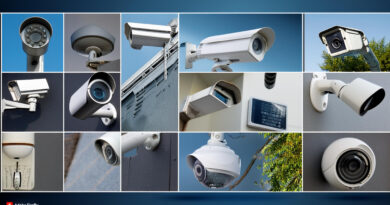5 best alternative to DJI DRONES

5 Best Alternatives to DJI Drones
In a market where DJI holds over 70% market share, finding quality alternatives has become increasingly important for drone enthusiasts and professionals alike. As we move through 2025, concerns about data privacy, potential U.S. legislative bans, and the desire for specialized functionalities have pushed many users to explore beyond the industry giant. Whether you’re worried about security issues with Chinese-made drones or simply seeking features that DJI doesn’t offer, the good news is that competitors have stepped up their game significantly.
The drone landscape has evolved dramatically, with companies like Autel, Potensic, and Anzu Robotics now offering compelling options that rival—and sometimes surpass—DJI’s capabilities. From budget-friendly models with impressive 4K cameras to professional-grade drones with thermal imaging and advanced mission planning, these alternatives deliver innovation without compromise. 🚁 The question isn’t whether alternatives exist, but rather which alternative best suits your specific needs in terms of camera quality, flight time, intelligent features, and price point.
In this comprehensive guide, we’ll explore the top DJI alternatives across various categories, from affordable options for beginners to premium choices for professional applications. We’ll examine what makes each drone stand out, dive into their photography and videography capabilities, and provide you with the essential factors to consider before making your purchase decision. Let’s discover the perfect DJI alternative to elevate your aerial experience in 2025!
Why Consider DJI Alternatives in 2025
As we move through 2025, the drone market continues to evolve, with many users looking beyond industry giant DJI for their aerial photography and videography needs. While DJI has dominated the market for years, several compelling reasons have emerged for considering alternative options.
Security and Data Privacy Concerns
One of the primary motivations for exploring DJI alternatives is the increasing concern over data privacy. Multiple reference sources highlight allegations of unauthorized data transmission by DJI drones, raising significant security questions for both personal and professional users. These concerns are particularly acute for:
- Government agencies handling sensitive information
- Corporate users with proprietary data
- Privacy-conscious consumers worried about where their flight data and images are stored
Many alternative manufacturers now emphasize enhanced data security measures and transparent data handling policies as key selling points against DJI products.
Legislative Challenges and Potential Bans
The regulatory landscape surrounding DJI drones has become increasingly complex in 2025. As mentioned in the reference materials, ongoing legislative efforts in the United States have created uncertainty about the future availability of DJI products:
- The National Defense Authorization Act (NDAA) prohibits the use of drones with specific foreign components, particularly from China
- Self-reported compliance requirements have pushed organizations toward NDAA-compliant alternatives
- Potential tariffs on Chinese-made drones have impacted pricing and availability
These legislative challenges have prompted many government agencies and businesses to proactively transition to alternative drone platforms to ensure operational continuity and compliance.
Need for Specialized Features
While DJI offers an impressive range of drones, they don’t necessarily meet all specialized needs. Many users require specific functionalities that DJI doesn’t prioritize:
- Modular designs allowing for customized payload integration
- Open-source platforms enabling software modifications
- Specialized sensors for industrial applications
- Advanced autonomous flight capabilities for specific commercial uses
Organizations with unique operational requirements often find that alternative manufacturers provide more flexibility and customization options tailored to their specific use cases.
Support for Domestic Manufacturers
A growing preference for domestically produced drones has emerged among many consumers and organizations. This trend reflects:
- Desire to support local economies and innovation
- Concerns about supply chain risks due to geopolitical factors
- Alignment with organizational procurement policies
- Potential for more responsive customer service and support
Many alternative drone manufacturers emphasize their domestic production as a competitive advantage against DJI’s international manufacturing base.
With these considerations in mind, many users are actively exploring the diverse drone market beyond DJI. Now that we’ve examined the key factors driving interest in alternatives, let’s explore the top DJI alternatives specifically designed for budget-conscious users in our next section.
Top DJI Alternatives for Budget-Conscious Users

Top DJI Alternatives for Budget-Conscious Users
Now that we’ve explored why you might consider alternatives to DJI drones in 2025, let’s focus on budget-friendly options that deliver excellent value without breaking the bank. While DJI has dominated the drone market, several manufacturers offer compelling alternatives for those watching their spending.
Potensic Atom SE: Best Overall Value
The Potensic Atom SE stands out as the best overall value drone for budget-conscious users. Featuring a 4K camera with gimbal stabilization, this drone delivers impressive video capabilities at a fraction of DJI’s price. The Atom SE provides high-quality aerial footage that rivals more expensive models, making it perfect for beginners and hobbyists who want professional-looking results without the professional price tag.
What makes the Atom SE particularly appealing is its balance of features, performance, and affordability. While it doesn’t match DJI’s most advanced offerings, it provides more than enough functionality for most recreational users and content creators working with limited budgets.
BetaFPV Cetus: Ideal Entry-Level FPV Experience
For those interested in first-person view (FPV) flying, the BetaFPV Cetus offers an exceptional entry point into this exciting aspect of drone piloting. As an all-in-one FPV kit, the Cetus comes with everything beginners need to start experiencing the thrill of FPV flight.
The Cetus is specifically designed with new pilots in mind, offering user-friendly controls and a gentle learning curve. While it doesn’t boast the camera quality of photography-focused drones, it excels at providing an immersive flying experience that helps build piloting skills – a perfect starting point before investing in more expensive equipment.
Specta Mini: Reliable 4K Drone for Beginners
The Specta Mini has earned its reputation as a reliable entry-level drone with impressive 4K video capabilities. This compact drone offers beginners a straightforward flying experience while still capturing high-quality footage. Its user-friendly interface makes it accessible for newcomers to drone photography and videography.
While the Specta Mini lacks some of the advanced features found in premium models, it delivers solid performance for its price point. The 4K recording capability means beginners can create content that still looks professional on most platforms, making it an excellent choice for those just starting their aerial photography journey.
HoverAir X1: Affordable Selfie Drone Option
The HoverAir X1 presents an affordable alternative for those primarily interested in selfie capabilities. This compact drone focuses on providing basic functionality with essential safety features, making it ideal for casual users who want to capture aerial selfies and group photos.
Though it doesn’t offer the higher-end video quality found in other models on this list, the HoverAir X1’s accessibility and ease of use make it a practical choice for social media enthusiasts and travelers who want to document their experiences from unique perspectives. Its simplified controls and focus on automated flight modes mean even complete beginners can achieve impressive results.
With these budget-conscious options in mind, next, we’ll explore premium alternatives to DJI drones for those with professional requirements and higher performance expectations. These high-end options deliver advanced features and capabilities that compete directly with DJI’s professional lineup while offering distinct advantages in specialized applications.
Premium Alternatives for Professional Applications

Premium Alternatives for Professional Applications
Now that we’ve explored budget-friendly options for those looking to avoid DJI drones, let’s elevate our discussion to premium alternatives designed specifically for professional applications. These high-end options provide advanced capabilities that rival or even surpass what DJI offers in the professional space.
Autel EVO Max 4T: Advanced Features and Thermal Imaging
The Autel EVO Max 4T stands out as a formidable DJI competitor in the professional drone market. This drone excels in industrial inspections and professional applications thanks to its integrated thermal imaging capabilities. Unlike standard DJI models, the EVO Max 4T comes with sophisticated sensors and enhanced data security features that make it particularly attractive for sensitive operations. With a flight time comparable to premium DJI models at approximately 40 minutes, it offers the endurance needed for comprehensive professional missions. The drone’s robust transmission system ensures reliable connectivity at extended ranges, making it suitable for large-scale projects where maintaining a stable connection is critical.
Skydio X10: Superior Autonomous Flight Capabilities
The Skydio X10 represents the pinnacle of autonomous drone technology in 2025. This American-made alternative outshines DJI in obstacle avoidance and self-piloting capabilities. Professional users will appreciate its advanced AI-powered navigation system that enables complex flight patterns even in challenging environments. The X10 features impressive camera specifications with high-resolution sensors and professional-grade stabilization. What truly sets the Skydio X10 apart is its unmatched ability to follow subjects while navigating around obstacles with minimal user input – a game-changer for solo operators in dynamic filming scenarios.
Freefly Alta X: Ultimate Cinematography Solution
For cinematography professionals seeking the absolute best in aerial imaging platforms, the Freefly Alta X delivers exceptional performance. This premium drone is purpose-built for high-end film production with an impressive payload capacity that can accommodate professional cinema cameras. Unlike DJI’s offerings, the Alta X features a unique design optimized for cinematography workflows, allowing for unprecedented creative control. While it comes with a significantly higher price point than most DJI alternatives, the Alta X justifies its cost through unmatched image quality and flexibility for professional filmmakers who demand nothing but the best for their productions.
Parrot Anafi AI: Professional-Grade Alternative
The Parrot Anafi AI represents a compelling professional-grade alternative from a well-established European manufacturer. This drone combines advanced artificial intelligence with impressive 4K imaging capabilities in a compact form factor. Unlike many DJI models, the Anafi AI emphasizes data security and compliance with stringent regulations, making it particularly suitable for government and enterprise applications. Its sophisticated transmission system provides reliable control at extended ranges, while its AI-enhanced features streamline complex workflows for mapping and inspection tasks. The Anafi AI offers professional users a non-Chinese alternative with comparable performance to DJI’s professional lineup.
With these premium options covered, we’ll next explore Photography and Videography Focused Alternatives that specialize in capturing stunning aerial imagery for creative professionals who prioritize image quality above all else.
Photography and Videography Focused Alternatives

Photography and Videography Focused Alternatives
Having explored premium alternatives for professional applications, let’s turn our attention to drones specifically designed with photography and videography capabilities in mind. These models offer specialized features that cater to content creators seeking high-quality aerial imagery without the DJI brand name.
Autel EVO Lite+: 6K Video with Adjustable Aperture
The Autel EVO Lite+ stands out as a formidable photography-focused alternative to DJI drones. This model features an impressive 6K video camera with adjustable aperture settings, giving photographers and videographers greater creative control over their shots. While it offers longer flight times compared to many competitors, some users note that its color quality doesn’t quite match what DJI provides. Nevertheless, the adjustable aperture is a significant advantage for professional photographers who need to adapt to varying lighting conditions. This drone serves as a strong competitor to models like the DJI Air 3S, making it worth considering for serious aerial photography enthusiasts.
HoverAir X1 Pro Max: 8K Camera with AI Tracking
For content creators seeking cutting-edge resolution, the HoverAir X1 Pro Max delivers with its outstanding 8K camera capabilities. This drone excels with advanced AI tracking functionality that automatically follows subjects, making it ideal for capturing dynamic action sequences or self-filming. The AI tracking system ensures you stay in frame without manual control, perfect for solo creators. While the HoverAir X1 Pro Max offers exceptional video quality, it does have some limitations in battery life and range compared to other models in this category. For those who prioritize camera quality and automated filming capabilities over extended flight time, this drone presents a compelling non-DJI option.
Anzu Robotics Raptor: DJI Clone with U.S. Compliance
The Anzu Robotics Raptor has emerged as what many consider the best “DJI clone” on the market. This drone leverages technology similar to DJI’s while ensuring full compliance with U.S. regulations—a significant advantage given the ongoing legislative discussions regarding potential restrictions on DJI products due to security concerns. The Raptor offers comparable performance and features to popular DJI models but addresses the compliance issues that have troubled some commercial and government users. This makes it particularly appealing for professional photographers and videographers who need to adhere to strict organizational or governmental procurement policies while maintaining high production standards.
Fimi X8 Mini: Cost-Effective Photography Solution
For those seeking quality aerial photography capabilities without breaking the bank, the Fimi X8 Mini presents a cost-effective solution. This compact drone delivers solid 4K video performance at a significantly lower price point than premium alternatives. While it may not include all the advanced features found in higher-end models, it provides impressive image stabilization and camera quality for its price range. The Fimi X8 Mini is particularly well-suited for enthusiast photographers and videographers who want to capture aerial content without investing in more expensive equipment.
With these photography and videography focused alternatives in mind, next we’ll explore the key factors you should consider when selecting a DJI alternative to ensure you choose the drone that best matches your specific needs and requirements.
Key Factors to Consider When Choosing a DJI Alternative

Key Factors to Consider When Choosing a DJI Alternative
Now that we’ve explored the top photography and videography focused alternatives to DJI drones, it’s important to understand exactly what features and specifications you should prioritize when making your selection. Your ideal drone will depend on your specific needs, budget, and intended use cases.
Camera Quality and Stabilization Requirements
When evaluating camera performance, look beyond just resolution numbers. While drones like the HoverAir X1 Pro Max offer impressive 8K video capabilities, consider the sensor size which greatly impacts image quality, especially in challenging lighting conditions. For professional applications, models like the Autel EVO Lite+ with its 6K video and adjustable aperture provide creative control for serious photographers. Gimbal stabilization is non-negotiable for smooth footage—the Potensic Atom’s integrated stabilization system offers this critical feature at a more accessible price point.
Flight Performance and Battery Life
Battery life directly impacts your shooting time and creative possibilities. Most consumer drones offer 20-30 minutes of flight time, but this can vary significantly based on wind conditions and flight patterns. The HoverAir X1 Pro Max, while excellent for selfies with its AI tracking, has noted limitations in battery endurance. Consider how long you need to stay airborne for your typical shooting sessions, and whether carrying spare batteries is feasible for your workflow.
Range and Transmission Capabilities
Transmission range determines how far your drone can fly while maintaining stable video feed and controls. Professional options like the Autel EVO Max 4T provide extended range for commercial applications, while entry-level models like the Specta Mini offer more limited range suitable for beginners. Consider your shooting environments—urban videographers may need less range than those capturing landscapes or conducting industrial inspections.
Intelligent Flight Modes and Safety Features
Modern drones offer AI-assisted features that simplify complex shots. Obstacle avoidance systems, automated tracking, and preprogrammed flight paths can dramatically enhance your creative capabilities while keeping your investment safe. The Anzu Robotics Raptor, for example, incorporates advanced flight technologies similar to DJI but complies with U.S. regulations. For beginners, the BetaFPV Cetus provides an all-in-one FPV experience with safety features appropriate for learning.
Brand Support and Community Resources
The drone ecosystem extends beyond the hardware itself. Evaluate the manufacturer’s commitment to firmware updates, which can add features and fix issues throughout your drone’s lifespan. Community support can be invaluable—brands with active user forums and comprehensive tutorial libraries provide resources for troubleshooting and skill development. While DJI has historically excelled in this area, companies like Autel and Parrot have developed robust support systems with growing communities of enthusiasts and professionals.
Consider how these factors align with your specific needs when choosing from the best DJI alternatives in 2025. Whether you’re focused on budget options like the Potensic Atom SE, mid-range solutions like the Fimi X8 Mini, or professional systems like the Parrot Anafi AI, understanding these key considerations will help you find the perfect match for your aerial photography and videography requirements.

Choosing the Right DJI Alternative for Your Needs
As we’ve explored throughout this article, the drone market in 2025 offers numerous compelling alternatives to DJI products across various price points and specializations. Whether you’re a budget-conscious hobbyist looking at options like the Potensic Atom or HoverAir X1, a professional seeking high-end capabilities from the Autel EVO Max 4T or Freefly Alta X, or a photography enthusiast drawn to the impressive camera features of the Autel EVO Lite+ with its 6K video and adjustable aperture, there’s truly something for everyone beyond the DJI ecosystem.
When making your decision, remember to prioritize the factors we discussed: assess your specific needs and budget, evaluate camera quality and flight performance metrics like battery life and range, consider intelligent flight modes for safety and creative shooting, and research brand reputation and ongoing support. With growing concerns about data privacy and potential regulatory issues surrounding DJI products, exploring these alternatives isn’t just about finding different features—it’s about discovering innovative technology that may better align with your values and requirements. The drone industry continues to evolve rapidly, and by looking beyond market leaders, you might find the perfect flying companion that offers exactly what you need for your aerial adventures.






